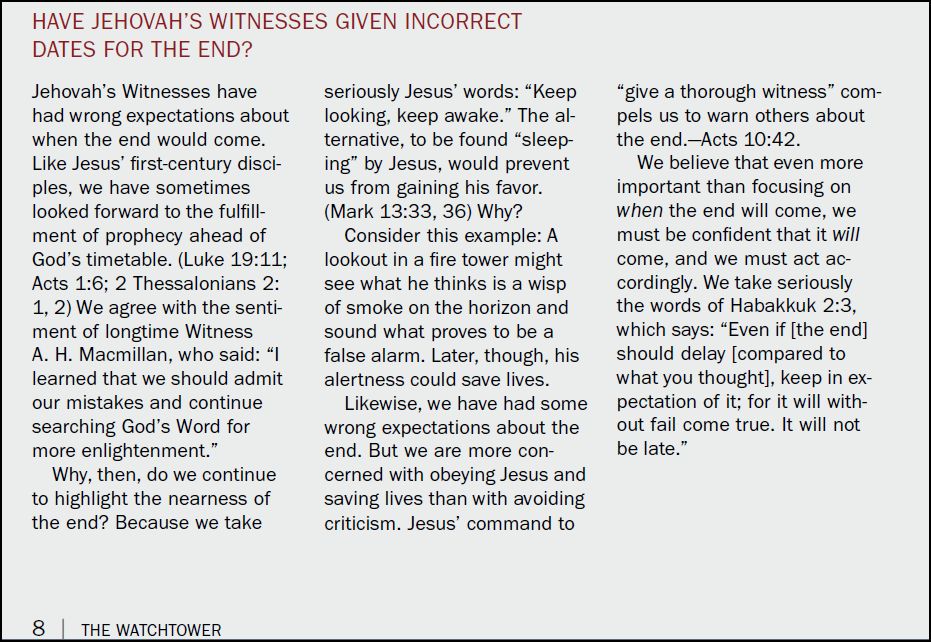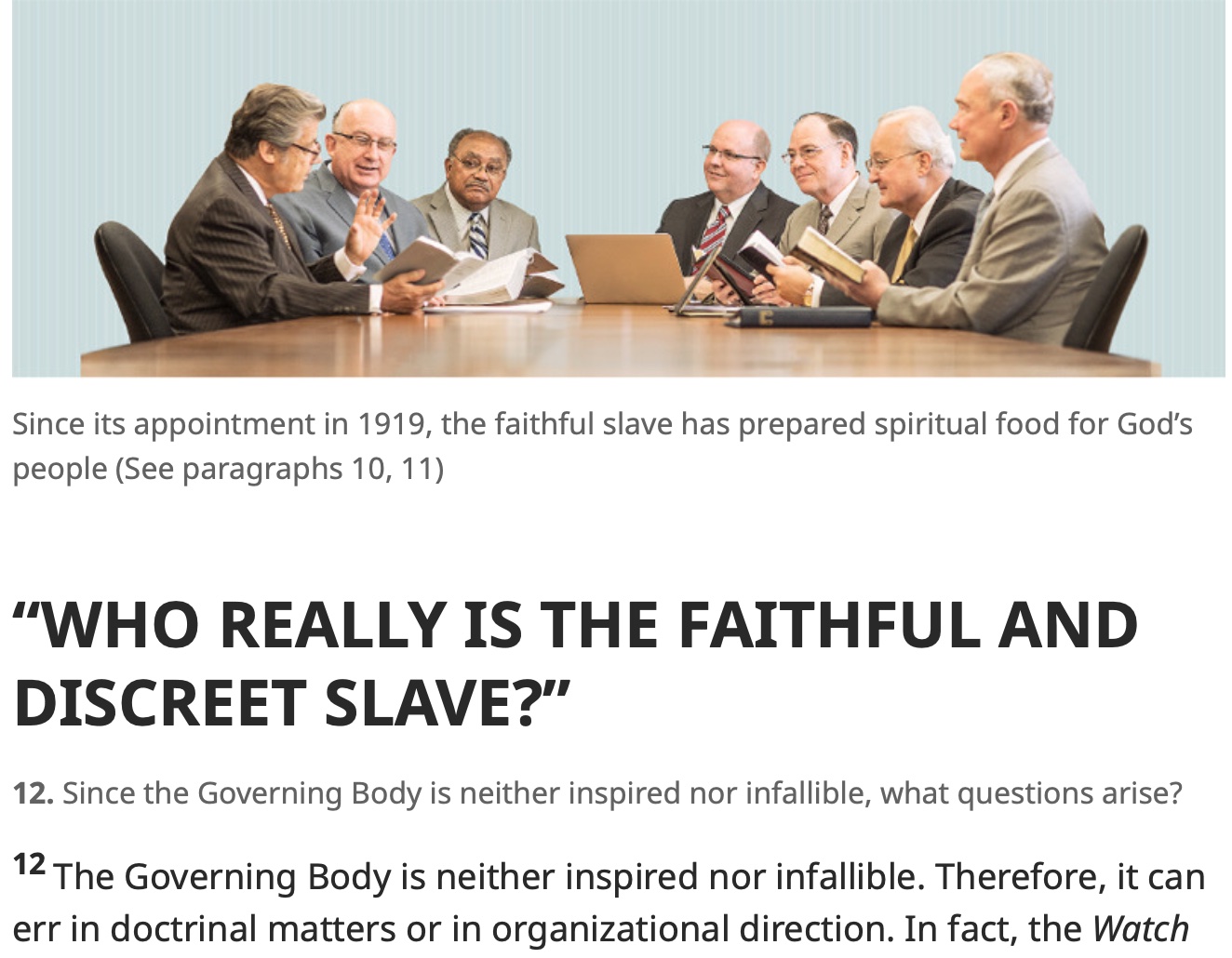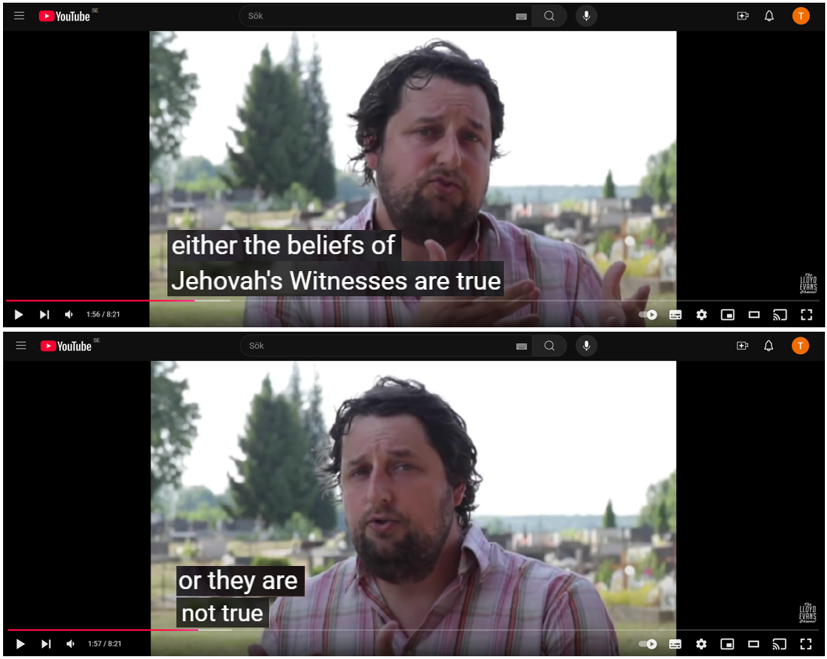home > core concepts > justification for errors
Watchtower Justification for Doctrinal Error
Watchtower doctrine has changed and continues to change. How does Watchtower excuse that a large portion of the orginal doctrine is no longer accepted as true?
Light Gets Brighter
Watchtower uses Proverbs 4:18 as its primary justification for why teachings change.
"But the path of the righteous ones is like the bright morning light that grows brighter and brighter until full daylight." Proverbs 4:18 NWT 2013 ed.
Proverbs 4:18 does not refer to doctrine, as Proverbs chapter 4 is a comparison of behaviour between good and bad people. Furthermore, Watchtower changes regularly do not clarify teachings, but completely change them. At other times, teachings have been changed, but later have reverted back to a previous teaching.
The Light Gets Brighter goes into detail on why Proverbs 4:18 does not allow for false teachings.
Apostles Made Mistakes
Watchtower justifies errors through comparison with the Apostles and the mistakes that they made.

Watchtower 2013 Jan 1 p.8
"Like the apostles of Jesus Christ, they have at times had some wrong expectations." Reasoning from the Scriptures p.136
In a similar vein, I have received emails from Jehovah's Witnesses that God used Moses, Abraham, David and other kings, priests and prophets to lead his people, even though they were sinners.
This is a straw-man argument, as it addresses an issue quite different to the one at hand. This is not a question of individual early Christians, Jehovah's Witnesses or members of the Governing Body being perfect or holding to a perfect understanding of doctrine. The issue is whether the Governing Body operates under guidance of Holy Spirit as a collective group, after prayer. Does Jehovah direct what appears in the Watchtower journals? Obviously not, since so much has been wrong.
Rather than suggesting that Apostles made mistakes, consider "What percentage of the Apostles writings in the Bible are wrong?" Zero percent. "What percentage of Watchtower statements has been wrong?" The difference being, the Apostles were directed by holy spirit, the Governing Body is not.
Since Watchtower's Governing Body is unlike the Apostles and not directed by God when arriving at doctrine, they should not be followed blindly, without question.
God is testing us
Another justification has been used several times after Watchtower prophecies went unfulfilled. The Watch Tower 1916 February 1 said about the incorrect understanding of 1914:
"We inferred from this that the Church's 'change' would take place on or before that date. But God did not tell us that it would be so. He permitted us to draw that inference; and we believe that it has proven to be a necessary test upon God's dear saints everywhere."
What sort of group would accuse God of allowing them to promote falsehood as a test of his followers? If false teachings are a test from God, how do we differentiate between one Church and the other?
Eager
Additional Watchtower justification for incorrect interpretations is to attribute them to eagerness. People that criticise this righteous eagerness are negatively trying to divert people from the importance of the times.
"It is easy for the established churches of Christendom and other people to criticize Jehovah's Witnesses because their publications have, at times, stated that certain things could take place on certain dates. Have they not, rather, encouraged spiritual sluggishness by considering expectation of "the end" to be "meaningless" or "an insignificant myth"? Have apostates promoted Christian alertness? Have they not, rather, induced spiritual sleepiness?" Watchtower 1984 Dec 1 p.18
"Jehovah's Witnesses, in their eagerness for Jesus' second coming, have suggested dates that turned out to be incorrect." Awake! 1993 Mar 22 p.4
"In modern times such eagerness, commendable in itself, has led to attempts at setting dates for the desired liberation from the suffering and troubles that are the lot of persons throughout the earth." Watchtower 1980 Mar 15 p.17
In application to itself the Watchtower insinuates that alertness is more important to truthfulness. In application to other religions sincerity is not enough, teaching untruths makes their followers unacceptable to God.
"For us to be acceptable to God, our sincere beliefs must be based on accurate information. Jehovah's Witnesses in your community will be happy to assist you in examining what is involved in serving God with sincerity and truth." Watchtower 2003 Feb 1 p.32 Sincerity-Desirable, but Is It Enough?
To be eager does not justify being totally wrong. Many religions are eager, without relying on false predictions to motivate their members. The Seventh-day Adventists use statements such as "See you later, God Willing" to show they recognise God may intervene at any stage. This is a healthy recognition of God's timetable without encouraging serving to a date. Making mistakes in God's name has not promoted long term eagerness; it has resulted in followers losing their faith in the Organization.
Not inspired, not infallible
Watchtower claims Jehovah's holy spirit guides the Governing Body when interpreting the Bible, which is why they are the only religion teaching truth.
"The plain truth is that we cannot say that we trust in Jehovah if we do not trust in his earthly representatives—those whom Jehovah trusts.
Today Jehovah leads the earthly part of his organization by means of “the faithful and discreet slave.” ... We show that we trust in Jehovah’s way of doing things by heeding the direction we receive from the organization and the elders." Watchtower 2022 Feb p.4
Yet when excusing its history of wrong teachings, the Governing Body claim not to be inspired or infallible.
"They do not claim that this slave class is infallible, but they do view it as the one channel that the Lord is using during the last days of this system of things." Proclaimers p.626

Watchtower 2017 Feb Study Edition p.26
It makes no sense to claim to be directed by holy spirit but not inspired, because the definition of inspired means to be directed by holy spirit.
Watchtower claims "of course" Watchtower does not produce perfect food.
"Of course, Jesus did not tell us that his faithful slave would produce perfect spiritual food." Watchtower 2017 Feb p.26
"Of course" is included in the sentence to subtly influence the reader, yet comes with no logical justification. If Jehovah is perfect, and he inspired Bible writers to provide the Bible to be perfect and infallible, for what possible reason would he direct his organisation in our time to include falsehoods? If the Watchtower Governing Body proclaim to be part of the faithful slave, then it should be held to the same standard as the slave in the first century.
Directed by Holy Spirit discusses the this topic at length.
Does Jehovah's direction include falsehoods
Brighter light is used to explain why previous doctrine was wrong. It is never presented as showing that current doctrine is likely to be also wrong. Yet that is the result if the Brighter light justification is applied to current truth.
"Furthermore, the Bible’s counsel is timeless. Although it was completed nearly 2,000 years ago, its words are still applicable." A Book For All People p.26
If Bible guidance remains applicable after 2,000 years, why is much Watchtower doctrine out of date every few decades?
Rutherford made the comment that "only as the Lord God directs the "servant" to speak he does speak..." Is God directing the Servant, or Slave as it is now called, to speak falsehoods and errors? Is not such a concept blasphemous?
"The "servant" is not to tell his own message. Jehovah has made his "faithful servant" the "watchman", and only as the Lord God directs the "servant" to speak he does speak, having always a "Thus saith the Lord" for every part of the message that is delivered." Vindication Vol-1 (1931) p.45
What is the difference between "imperfect spiritual food" and "false religious teachings"? The only difference is whether Watchtower is applying the term to their own false teachings, or the false teachings of other religions.
The Watchtower Society did not originate the concept of excusing failed predictions as "new light". Barbour had used this concept to justify why the end did not arrive as predicted in 1874. Religions claiming to have all the answers consistently prove to be wrong. The Watchtower reliance on the "new light" doctrine is no more than an excuse to justify inaccuracies. "New light" is an unhealthy concept that promotes blind, unquestioning devotion to an earthly Organization.
Deuteronomy 18:20 - 22 provides a foolproof way to determine if words spoken have come from God:
"However, the prophet who presumes to speak in my name a word that I have not commanded him to speak or who speaks in the name of other gods, that prophet must die. And in case you should say in your heart: "How shall we know the word that Jehovah has not spoken?" when the prophet speaks in the name of Jehovah and the word does not occur or come true, that is the word that Jehovah did not speak. With presumptuousness the prophet spoke it."
Watchtower changes include numerous false dates, significant doctrine and the promotion of pagan symbols and teachings. Rules on shunning, medical advice and education have been adversely life changing, even life threatening. Falsehood does not originate from Jehovah. Doctrinal meandering cannot be justified as new light; rather it is proof that God does not direct Watchtower or the Governing Body.
Terms used For Incorrect Watchtower Doctrine
“errors”
“mistakes”
“misplaced zeal”
“unrealized hopes”
“previous failures”
“misinterpretations”
“misunderstandings”
“our understanding”
“misplaced optimism”
“wrong expectations”
“hopes and expectations”
“premature expectations”
“misplaced expectations”
“disappointed expectations”
“errors in their teachings”
“incomplete concepts”
“inaccurate concepts”
“serious disappointments”
“formerly cherished views”
“mistakes in their understanding”
“views in need of refinement”
“an expressed opinion”
“cherished errors”
“wrong beliefs”
“old truths”
“past truths”
“expectations needing some adjustment”
“matters on which corrections of viewpoint have been needed”
Terms Used For Incorrect Doctrine of Other Religions
“falsehoods”
“false stories”
“false teachers”
“false teachings”
“false doctrines”
“false prophets”
“false prophecies”
“false religious views”
“false religious teachings”
“false religious philosophies”
“doctrines with pagan religious routes”
“God dishonoring doctrines of Babylon the Great”
“the disfiguring of God”
“nauseating teachings”
“God dishonoring”
“pagan doctrines”
“godless myths”
Source: Captives of a Concept, Don Cameron, pp.55-56
Truth, in matter of religion, is simply the opinion that has survived - Oscar Wilde

Written 2005. Latest update July 2025.
![]() Paul Grundy 2005 - 2026
Paul Grundy 2005 - 2026
